SPLIT DECISIONS: Divided by politics, Blackfeet seek government reform
Story by Bjorn Bergeson
Photos by Elliot Natz
ANNE POLLOCK read the letter in silence. Someone had photographed and uploaded it to Facebook within the hour, like an Internet meme, but the heading at the top and the signatures at the end marked it as an official document. As she neared the end, she shook her head from side to side and her eyes welled up with tears of frustration.
The letter was written and signed by one faction of the Blackfeet Tribal Business Council and addressed to the other faction. It informed all the tribal employees their paychecks would not be issued on time the next day, or the day after that. Furthermore, it asked the employees to walk off of their jobs in protest against the other council, but Pollock knew that anyone who did that would be fired.
Pollock is employed by the Indian Health Services. The program, like many others in the Blackfeet Nation, is federally funded. As a result, the council has to approve her paychecks as well as more than 800 other employees.
The council schism makes life confusing and frustrating, Pollock said, especially when employees can be fired on the whims of the council members.
“And that’s scary,” she said. “It’s scary because I’ve got bills to pay. I’ve got food to put on the table. It’s just not the easiest thing. Especially around here.”
In October 2013, the Blackfeet Tribal Business Council split into two separate factions: one faction run by Chairman Willie A. Sharp Jr., who was elected in 2010, and the other led by Council Secretary Roger “Sassy” Running Crane. Both factions blame the other for the split, and both sides have created a situation that leaves employees like Pollock and their paychecks caught in the middle.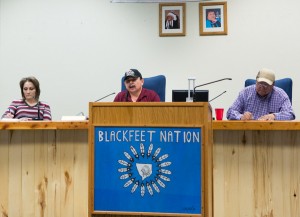
The political turmoil gripping the Blackfeet Nation isn’t new or unique to Indian Country. Many tribes have faced dysfunctional governments. For the Blackfeet, the issues dividing the council are multi-faceted. The problems stem from a boilerplate constitution that was adopted by the tribe in 1935. The constitution has no separation of powers.
Issues regarding tribal enrollment and blood quantum play a large role, as do oft-cited problems like nepotism, embezzlement and election fraud. A new tribal election is scheduled for June 6, 2014. But as the divide in the council has grown, fractures have started to appear in the bedrock of the community. Many people are pushing for change, but the struggle is in how to go about it.
“Well, what’s going to happen tomorrow?” Pollock asked. “Are we going to go to work? Are our paychecks going to be there? Or are we not going to get them until Friday? Or are we not going to get them for a couple of weeks?”
Still, Pollock said she is one of the lucky ones. Anna Bull Shoe, Pollock’s partner, brings in enough money through her own business, making and selling breakfasts at the schools and the hospital in Browning, that even when Pollock’s checks come late, they have been able to make it through. But many tribal employees are trying to support families on one paycheck. And when the money isn’t there on payday, the situation can turn dire.
Bull Shoe is one of many people trying to improve the situation. She has been collecting documents and signatures for a recall petition that if accepted, would have the entire business council replaced before the upcoming election.
Time is running out, though. The Sharp faction has appointed an election board, a move the Bureau of Indian Affairs has declared illegal, while the Running Crane faction is seeking to reappoint the 2012 election board, which the BIA said would also be illegal. Regardless, both sides are pressing ahead with election plans. Despite its skepticism of both factions, the BIA has been reluctant to intervene, calling the matter an internal affair.
“It’s scary because I’ve got bills to pay. I’ve got food to put on the table. It’s just not the easiest thing. Especially around here.”
Either way, the Blackfeet Constitution states the business council must ratify any recall petition. Given the fractured governing body, that seems unlikely. Bull Shoe intends to file her petition directly with the BIA. The move goes against the constitution, but Bull Shoe said she sees no other solution.
“Which council would I take it to?” she asked. “The ones at the building, or the ones at the cafe? There is no council right now.”
She also plans to send copies of the petition to Washington, D.C., and Helena, as well as the regional BIA offices in Billings. Last, to make sure the petition doesn’t disappear, Bull Shoe intends to store a copy with a third party.
“That way they can’t just push it out of sight,” she said.
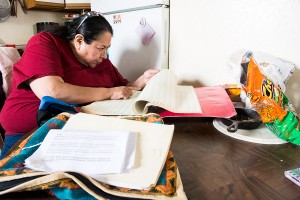 Bull Shoe said she’s collected more than the 2,500 signatures needed for the petition to succeed. But even if it were accepted, there’s many questions left unanswered. Would an interim council be able to succeed after years of conflict and corruption? Will the BIA take a proactive stance to manage the tribe while a permanent council is found? Would the next council do what no council has done yet and usher in important reforms that break the council’s grip on the reservation? The petition doesn’t answer these questions. But for Bull Shoe and the people who have signed the petition, it’s a glimmer of hope for the future.
Bull Shoe said she’s collected more than the 2,500 signatures needed for the petition to succeed. But even if it were accepted, there’s many questions left unanswered. Would an interim council be able to succeed after years of conflict and corruption? Will the BIA take a proactive stance to manage the tribe while a permanent council is found? Would the next council do what no council has done yet and usher in important reforms that break the council’s grip on the reservation? The petition doesn’t answer these questions. But for Bull Shoe and the people who have signed the petition, it’s a glimmer of hope for the future.
Many rumors surround the petition. Some people think there is an agenda behind it or that it’s a trick of one faction’s design. Bull Shoe talks of people who’ve said they would be fired if their signatures were found on the petition. People are afraid. Pollock said her supervisor has asked about her role in the petition. She fears she could be fired over it. But they both say there isn’t much choice.
“We have to do this,” Bull Shoe said. “We are going to get this done no matter what.”
Bull Shoe and Pollock have been driving across the reservation collecting signatures. Politics aren’t their only obstacle. Some of the people Bull Shoe trusted with signature sheets have stopped returning her calls, and others have overestimated the number of signatures they’ve collected.
SHAWNEE ROSE Skunkcap Momberg gets off of work at Head Start Early Child, and drives across Browning to visit her mom for a cup of coffee. Her mother, Robin Bear Child, lives in one of the newer houses on the government estates near the hospital.
Momberg works full time at Head Start, another program managed through the tribe. The program provides care and education for 200 children on the reservation. Like Pollock, Momberg’s paychecks are handled through the tribe.
“Our last normal paycheck was in mid-November, and then we didn’t get paid again until right before Christmas,” Momberg said. “It’s really stressful because I’ve got three kids and car payments and rent. To have to kind of lean on my mommy, that was really stressful.”
To compound the problem, Momberg said it’s hard not knowing how to budget out a check that won’t come on time.
“It’s hard to hang on to it, because it’s like I don’t want to spend this all right here and right now, I need to stretch it out till I get the next hopeful payday,” Momberg said.
In January, the tribe failed to pay its low-income account with Glacier Electric Cooperative. As a result, some families went without power for two weeks before the tribe was able to settle the balance.
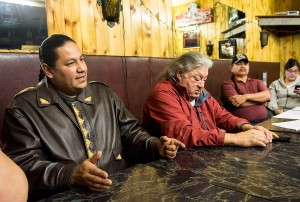 In February, the two council factions reached an agreement to keep the employees paid. The agreement was less than ideal for everyone. Employees fired by one side of the business council would continue to collect paychecks. Meanwhile, back pay for three council members who had been suspended for a year prior to the split would still be frozen.
In February, the two council factions reached an agreement to keep the employees paid. The agreement was less than ideal for everyone. Employees fired by one side of the business council would continue to collect paychecks. Meanwhile, back pay for three council members who had been suspended for a year prior to the split would still be frozen.
Many have asked Momberg and other employees why they would still come to work when their paychecks don’t come in.
“People were like, ‘Well, why are you even going to work? Everybody needs to … walk out,’” Momberg said. “But if we don’t go to work, there’s 400 kids that we don’t know if they’re getting to eat or if they’re going to have heat.”
She is skeptical of whether the Blackfeet political process can work: If a new council came in, there is little guarantee the same situation wouldn’t develop again. With no separation of powers built into the political system, the Tribal Business Council has absolute control over the judicial system, the law enforcement, and hiring and firing practices. And as with Anna Bull Shoe’s petition, changes need to be approved by the tribal business council, which leave the people with no recourse when they step out of line.
“If you don’t have a separation of powers, then you don’t have a fair government,” said Joe McKay, an attorney in Browning. “There’s no separation of powers, so they’re right if they say they are.”
McKay filed an injunction in tribal court against the Blackfeet Tribal Business Council on April 30. The goal of the injunction was to halt the election process until a BIA-approved election board could be appointed. The tribal court struck it down, leaving McKay without legal options.
“My point today was to force them to have a legal election so we can move forward,” McKay said over the phone.
For many on the reservation, the only way to move past the political mess created over the past year is to hold a new election. With five vacant seats, it could break the political deadlock.
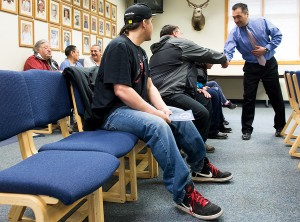 But there are complications. The Sharp faction, without a full quorum of elected council delegates, appointed the new election board, and the BIA have declared it illegal. Nevertheless, Sharp’s election board alleges the Running Crane faction has been trying to intimidate its members, a move the Running Crane side says is unfounded. The election board labeled Running Crane and his councilors as “opposition” and has refused to allow them to register for re-election. This prompted the BIA to issue another letter voicing concerns that the election may be biased.
But there are complications. The Sharp faction, without a full quorum of elected council delegates, appointed the new election board, and the BIA have declared it illegal. Nevertheless, Sharp’s election board alleges the Running Crane faction has been trying to intimidate its members, a move the Running Crane side says is unfounded. The election board labeled Running Crane and his councilors as “opposition” and has refused to allow them to register for re-election. This prompted the BIA to issue another letter voicing concerns that the election may be biased.
The BIA has stated in several recent letters to Chairman Sharp that unless a new election board is appointed by quorum, the BIA will not recognize any newly elected councilors. In that case, only four members of the council will be BIA approved. There would be no legal quorum of six, and the tribe could endanger its government-to-government relationship with the U.S.
McKay said the consequences of this would be far-reaching. If this election isn’t valid, then there would not be enough legally recognized councilors to have another election two years from now. The tribe would lose lucrative contracts. The BIA would be obligated to continue funding grants and programs, and tribal jobs would become BIA jobs.
“This could create a never-ending cycle of constitutional problems,” McKay said.
Despite misgivings about the election board, McKay is running for a council seat. He hopes to be able to enact constitutional reform that will give the Blackfeet Constitution separation of powers.
He doubts Bull Shoe’s petition would be effective because it would never make it past either version of the council.
“No one is going to say, ‘Oh yeah, there’s a bunch of names here. Lets put ourselves up for re-election,’” McKay said.
The problems with the Blackfeet Constitution are not unique. In 1935, the BIA imposed constitutions upon many tribes. Tribes have been allowed to amend and reform their constitutions, but the Blackfeet haven’t changed the document much over the years. The last push for reform was in 2010, and the council rejected it.
Dr. Ian Record, a managing director at the Native Nations Institute for Leadership, Management, and Policy with the University of Arizona has been studying governmental conflicts in Indian Country for over a decade. The current Blackfeet turmoil isn’t a unique situation, Record said.
 “Often it is a system or a constitution that was imposed on the tribe, by an external actor, usually the federal government,” Record said. “While it’s difficult, I think it would behoove the Blackfeet, and other nations who find themselves in these situations, to take a step back and think, ‘Is this really a leadership problem? Or is this an institution’s problem?’”
“Often it is a system or a constitution that was imposed on the tribe, by an external actor, usually the federal government,” Record said. “While it’s difficult, I think it would behoove the Blackfeet, and other nations who find themselves in these situations, to take a step back and think, ‘Is this really a leadership problem? Or is this an institution’s problem?’”
The problem with the Blackfeet situation is the current system makes it hard for reforms to be implemented. Nevertheless, Record said the BIA shouldn’t intervene in the turmoil.
“The reason that the Blackfeet, and so many other nations, find themselves in these governmental predicaments is precisely because the feds did get involved,” Record said. “Because they said, ‘We know how you should govern yourselves, and this is the constitution you should use, and this is the way you should make decisions.’ And now Native nations are struggling with the legacy of that.”
Constitutional reform is the hope of many on the reservation. But with a questionable election in the future and political gridlock at the present, reform is a long way off, and the waiting isn’t easy for the people caught in the middle.
ANNA BULL SHOE hoped to get more signatures for the petition from a friend in Heart Butte, 30 miles south of Browning, but when she arrived, he wasn’t around. For Bull Shoe, this is a common thing. People say they’ve filled out the pages of signatures, but when she comes to collect, they aren’t around or they’ll say the pages are missing.
She doesn’t let it spoil her day though. She decided to drive out to look at the home she and Pollock intend to move into over the summer. It’s down a rough dirt road, nearly halfway between Heart Butte and Browning. She drives her Cadillac gingerly through the deep clay, coming to rest on top of a hill a quarter mile from the home.
“We’ll have to walk from here,” Anna said.
Walking past a decrepit building on the way, Anna begins to tell the history of the land. It belongs to a farmer who lives nearby, on the opposite side of the highway, she said. The house they’re moving into is actually an old school building. While Anna talks, Pollock picks wild sage.
The large building is a bit of a fixer-upper. Parts of the roof have broken with age. Windows have had bricks thrown through them, probably by drunken teens. Birds moved into the attic, and, as a result, large sections of the floor below are covered in their waste.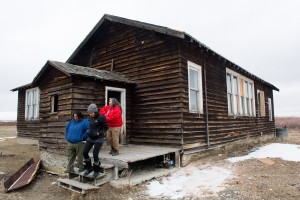
While they’ve been living in Browning, Pollock and Bull Shoe have used the school building as a storage space. One room that used to serve as a gymnasium and for church sermons is now crowded with bags of belongings.
“See, here’s where they used to worship,” Bull Shoe said, lifting a large black bag off the floor to reveal a painting of a cross and two hands joined in prayer.
Getting the building to a liveable state will take hard work and dedication. Friends and family have offered to help out when they can, but it will take effort, time and unity from many people to get the job done.
Like the building, Bull Shoe and Pollock think the tribal government is in need of repair, even though it’s a massive undertaking for the people of the land.
Looking out the window across the still-dead-from-winter hills and trees, Bull Shoe remains hopeful the petition will work. The election, she said, won’t go far enough to fix the problems of the people.
“They’re not good leaders,” she said. “We need to get them all out. Then we could start again.”
The greatest hope for Bull Shoe and Pollock is that the next council will reform the constitution and create a government that protects and listens to the people.
“We need separation of powers,” Pollock said. “So that way the chairman and the council don’t have so much power.”
But even if Bull Shoe doesn’t get the petition in, or if it fails to get past BIA scrutiny, she said she is still proud they have tried to fix the problems.
“Even if they kick it back, even if we don’t get past the 2,500, that’s still more people than what they had vote in the last election,” Bull Shoe said.
As the Sharp faction pushes forward with their election board, the Running Crane faction has once again suspended paychecks for tribal employees. As this story goes to print, paychecks have been withheld for two weeks on the Blackfeet Indian Reservation.
The Running Crane faction has said they will release paychecks only after a new election board is in place, and the Sharp faction has made no indication they are willing to compromise. So with nothing to break the political gridlock and only the hopes of an uncertain election on the horizon, the people of the Blackfeet tribe must wait.
- Anna Bull Shoe sits at her kitchen table in Browning, reading from a thick document naming enrolled members of the Blackfeet tribe. Bull Shoe uses the document to verify signatures on her petition to remove the entire Blackfeet Tribal Business Council. To sign the petition, a tribal member must be 18 and eligible to vote.
- Shortly after striking a temporary deal with Blackfeet Business Council Chairman Willie A. Sharp Jr. to pay tribal employees, councilmen Leonard Guardipee, left, and Roger Running Crane, center, talk with fired tribal employees at the Log Cabin Council headquarters at a closed cafe in Browning. Fifty five to 60 tribal employees were fired. The arrangement between councils held for one week.
- Three of the seven Willie A. Sharp Jr. faction members, Cheryl Little Dog, left, Leon Vielle and Sharp, send out a live telecast to the Blackfeet Nation from tribal headquarters. The telecast was in response to tribal paychecks being late again. During the telecast, Vielle called the Log Cabin Council “extortionists” and “terrorists,” saying their corruption would not be tolerated and they would not bend to the Log Cabin Council’s demands regarding paychecks. Shortly after, Sharp, Vielle and Little Dog talked with the Log Cabin Council and agreed to pay tribal employees.
- Anna Bull Shoe, left, Kila Bird and Anne Pollock visit the house they aim to move into by summer. In the coming months, Bull Shoe plans to renovate the house to make it livable for her family of eight.
- Mistee Rides At The Door was put on administrative leave after refusing to file a restraining order against Councilman Roger Running Crane on behalf of the Sharp faction.
- Roger Running Crane, center, talks with fired appellate Judge Julene Kennerly, right, and Shawn Augare shortly after a deal was struck between the Log Cabin Council and the Sharp Faction to pay tribal employees.
- Blackfeet Tribal Business Council candidate, Nathan De Roche, left, talks about tribal reform during a Blackfeet Against Corruption meeting. BAC is an activist group that supports the Sharp Faction.
- Bryon Farmer, (center) shakes hands with Councilman Paul McEvers. McEvers was previously suspended from the tribal council then brought back on after the council brought back after the schism in October. Farmer is one of the leaders of Blackfeet Against Corruption, an activist group that supports the Sharp Faction.
- Clouds hang over the land outside of Browning on the Blackfeet Indian Reservation.
 Native News Project 2014 | School of Journalism – University of Montana Native News Project 2014
Native News Project 2014 | School of Journalism – University of Montana Native News Project 2014

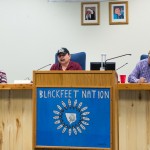
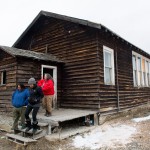


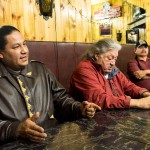
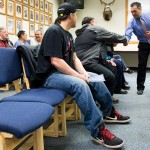



Recent Comments